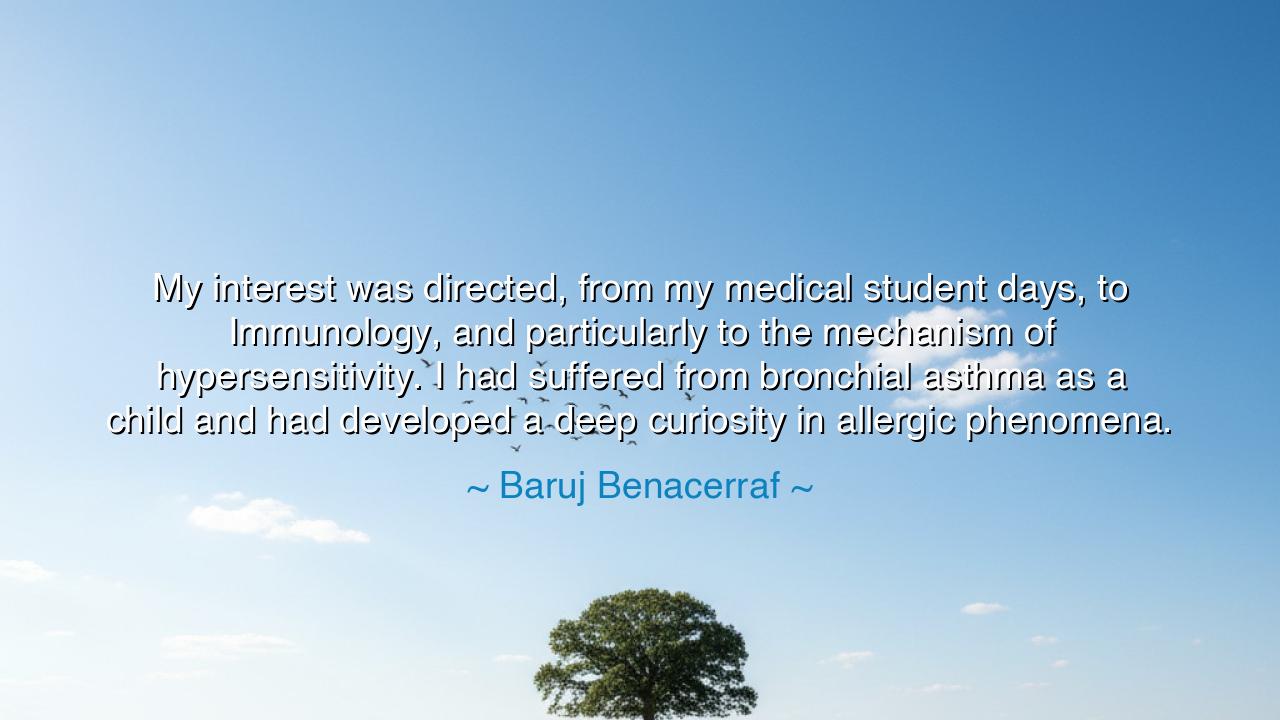
My interest was directed, from my medical student days, to
My interest was directed, from my medical student days, to Immunology, and particularly to the mechanism of hypersensitivity. I had suffered from bronchial asthma as a child and had developed a deep curiosity in allergic phenomena.






"My interest was directed, from my medical student days, to Immunology, and particularly to the mechanism of hypersensitivity. I had suffered from bronchial asthma as a child and had developed a deep curiosity in allergic phenomena." — Baruj Benacerraf
Hear now the thoughtful confession of Baruj Benacerraf, the physician and scientist whose mind illuminated the secret workings of the immune system — the unseen battlefield where life defends itself against the invader. In these humble words, he reveals the seed of his genius: that his suffering as a child was not a curse, but the spark that ignited his life’s purpose. When he says that his interest was directed to Immunology because of his own struggle with bronchial asthma, he speaks the ancient truth that pain, when met with curiosity and courage, becomes the teacher of destiny. Out of breath, he found breath again — not only for himself, but for all humankind.
The origin of this insight lies deep in the story of Benacerraf’s life. Born in Caracas, Venezuela, in 1920, and later raised in Paris and New York, he carried within him the burdens of illness and exile. As a child, his body rebelled against the air itself; his lungs constricted in fear of invisible enemies. Yet instead of retreating from the mystery of his affliction, he turned toward it. While others might have fled from what hurt them, he sought to understand it. Thus, his suffering became his compass, pointing him toward the field of Immunology, where he would one day unveil the principles that govern how the body knows itself — and how it mistakes that self in hypersensitivity and allergy.
The ancients, too, understood this paradox — that weakness may become wisdom, and that the path of healing often begins in the wound. The philosopher Epictetus, who walked with a crippled leg, taught that the trials of the flesh refine the soul. The blind Homer sang of heroism beyond sight, and Helen Keller, deaf and blind, became the voice of perseverance for millions. So too did Benacerraf transform affliction into insight. His asthma, the torment of his youth, became the doorway to discovery. Where others saw sickness as limitation, he saw it as a question posed by nature — and he devoted his life to answering it.
When he speaks of his curiosity in allergic phenomena, he reminds us that curiosity itself is a sacred act — a defiance of despair. To study what hurts us is to reclaim power from the unknown. Benacerraf’s fascination with the immune system led him to uncover the genetic basis of immune response, work that earned him the Nobel Prize in Physiology or Medicine in 1980. Yet his triumph was more than scientific — it was spiritual. He proved that understanding the mechanisms of life is not cold analysis, but a form of reverence. To study the body’s defenses is to marvel at the architecture of survival, to glimpse the hand of creation in the smallest of cells.
In his journey, there lies a lesson for all who seek meaning in their struggles. Every wound, every fear, every limitation hides within it a calling. The wise do not curse their pain; they question it. They ask, as Benacerraf did, Why has this come to me, and what does it wish me to learn? The sickness that once closed his lungs opened his mind. The darkness that surrounded him as a child became the light that guided his career. This is the alchemy of the human spirit — to turn hardship into purpose, suffering into service.
Let the modern seeker take heed: whatever afflicts you, study it. Whatever oppresses you, transform it. In every hardship lies hidden knowledge, waiting to be uncovered by those with patience and courage. If your body fails, learn from its language. If your heart breaks, learn from its silence. As Benacerraf’s life teaches, the path of discovery begins not with perfection, but with imperfection recognized and redeemed. The healer is often born from the healed.
So, O listeners of the future, remember this truth: suffering can be the beginning of wisdom if one dares to face it with curiosity. Do not turn away from your own weakness, for it may be your teacher. Seek, as Benacerraf did, to understand the mysteries that shape your being — for through understanding comes mastery, and through mastery, compassion. In the smallest struggle may lie the seed of greatness, and in every breath fought for, the whisper of destiny.
Thus, the legacy of Baruj Benacerraf endures — not merely in the annals of science, but in the timeless lesson he lived: that to study one’s pain is to transform it, and that from the depths of illness may rise the highest form of insight, discovery, and healing.






AAdministratorAdministrator
Welcome, honored guests. Please leave a comment, we will respond soon